Both composite and PVC decking are great for the Denver area, and especially better than any type of wood deck you can think of for various reasons.
Below, we’ll discuss the pros and cons of these two so you can choose the best decking material for your particular needs.
Let’s begin.
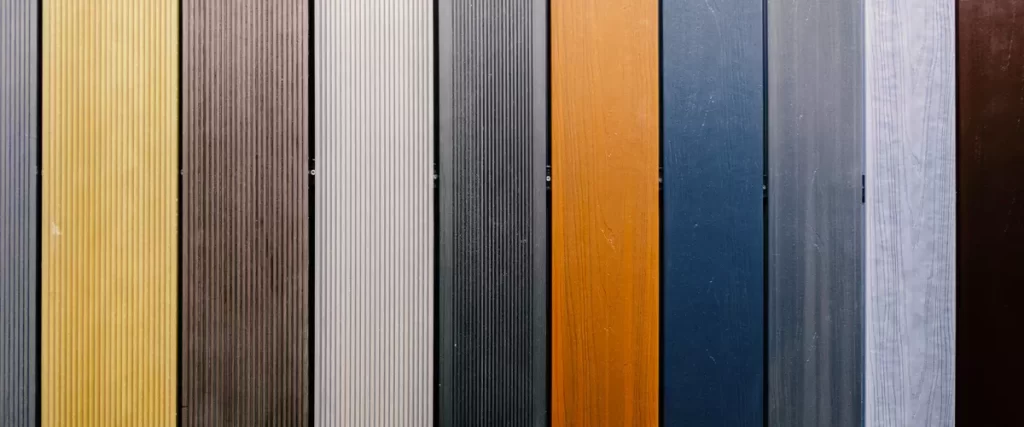
Pros and cons of PVC decking
| Pros of PVC Decks | Cons of PVC Decks |
|---|---|
| Durability: PVC decking is highly durable and resistant to rot, mold, and insect damage. It can withstand exposure to harsh weather conditions. | Cost: PVC decking tends to be more expensive upfront than other materials. However, low maintenance may offset this cost over time. |
| Low Maintenance: PVC decking does not require staining, sealing, or painting, offering homeowners minimal upkeep. | Heat Retention: In hot climates, PVC decking can become warm to the touch, potentially causing discomfort. |
| Moisture Resistance: PVC is inherently resistant to moisture, making it ideal for humid areas or locations near water. | Expansion and Contraction: PVC decking can expand and contract with temperature changes, requiring proper installation techniques. |
| Fade Resistance: PVC decking is designed to resist fading, maintaining vibrant colors over time. | Limited Repair Options: Repairs for damaged PVC boards can be challenging compared to wood. |
| Long Lifespan: When properly installed and maintained, PVC decking can have a long lifespan. | Not Environmentally Friendly: PVC production and disposal involve environmental concerns. |
| Color Variety: PVC decking offers a wide range of colors and patterns for versatile design options. | Slick When Wet: PVC decking can be slippery when wet, potentially posing safety risks. |
| Warranty: Some PVC decking boards come with extensive warranties, like 50+ or lifetime warranties for TimberTech AZEK PVC decking. |
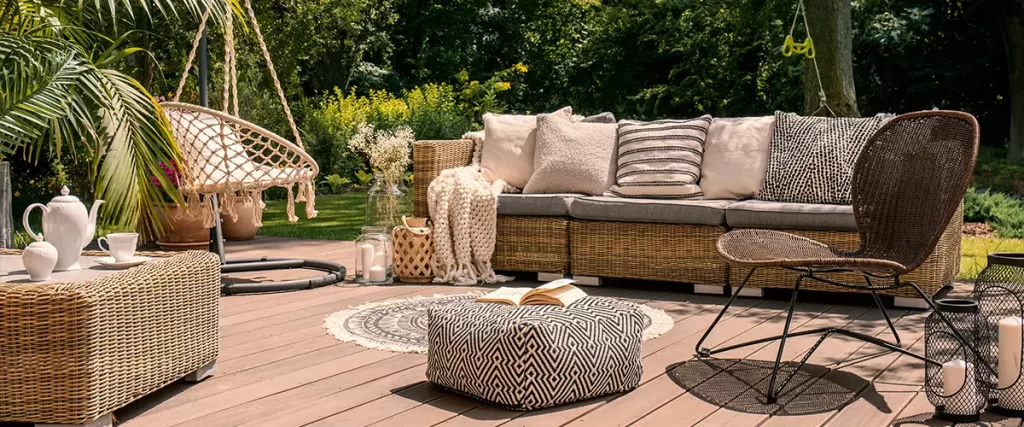
Pros and cons of composite decking
| Pros of Composite Decking | Cons of Composite Decking |
|---|---|
| Durability: Composite decking is highly durable and resistant to rot, mold, and insects, making it suitable for various climates. | Cost: Composite decking is generally more expensive than traditional wood initially. |
| Low Maintenance: It requires minimal upkeep, doesn't need staining or sealing, and won't splinter, crack, or warp over time. | Heat Retention: Composite decking, like PVC, can become warm in hot weather. |
| Appearance: It mimics the look of natural wood, providing a consistent appearance without natural wood's imperfections. | Scratch Resistance: While durable, it may be susceptible to scratches, especially from heavy furniture or sharp objects. |
| Environmentally Friendly: Many composite decking materials use recycled content, eliminating the need for new tree harvesting. | Weight: Composite decking is typically heavier than wood, affecting the installation process. |
| Fade Resistance: Designed to resist fading, ensuring vibrant colors over the years. | Limited Repair Options: Repairing damaged composite boards can be challenging. |
| Long Lifespan: Properly installed and maintained, it can have a long lifespan, providing a durable outdoor surface. | Slippery When Wet: Composite decking can be slippery when wet. |
TimberTech composite decking and Trex composite decking are two of our favorite choices for deck building. They’re made from plastic and wood fibers pressed together under extreme heat, and capped with an extra layer for protection. TimberTech is capped on all 4 sides giving it extra protection against moisture, while Trex is only capped on 3 sides, hence its lower price.
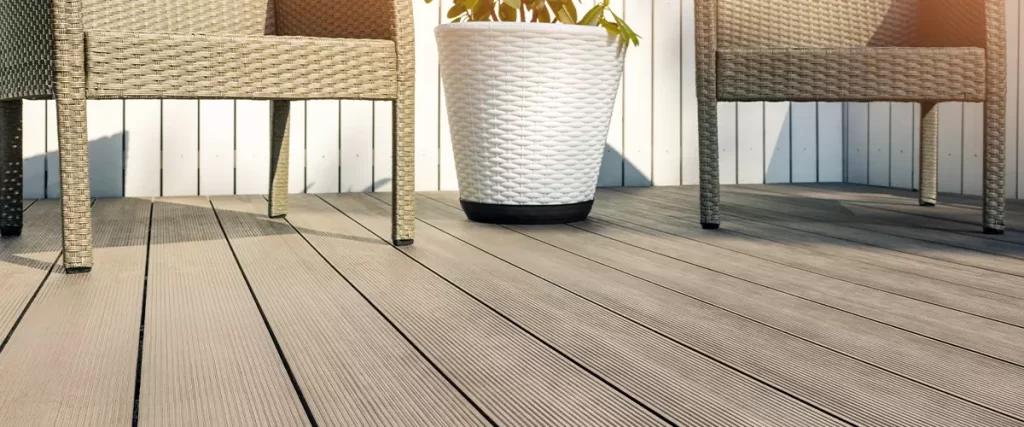
Are PVC Decks Better Than Composite Decks In Denver, CO?
Climate
- PVC: PVC decking tends to be more resistant to moisture, making it suitable for areas with varying weather conditions. It does not absorb water, preventing issues such as warping, cracking, or rot.
- Composite: Composite decking also has good moisture resistance, but its performance can depend on the specific formulation and brand. It generally performs well in areas with fluctuating humidity levels.
Temperature and Sun Exposure
- PVC: PVC decking may become warm to the touch in hot climates, which can be a consideration in sunny areas like Denver. Some PVC products incorporate technologies to reduce heat absorption.
- Composite: Composite decking can also become warm, and like PVC, some products are designed to address heat retention.
Maintenance
- PVC: Both PVC and composite decks are low-maintenance options. PVC does not require staining, sealing, or painting, and it’s resistant to mold and mildew.
- Composite: Composite decking also requires minimal maintenance, with no need for regular staining or sealing. However, it may need occasional cleaning to prevent mold or mildew growth.
Cost
- PVC: PVC decking tends to be more expensive upfront compared to composite decking.
- Composite: While composite decking is generally more affordable than PVC, the cost can vary depending on the brand and specific features.
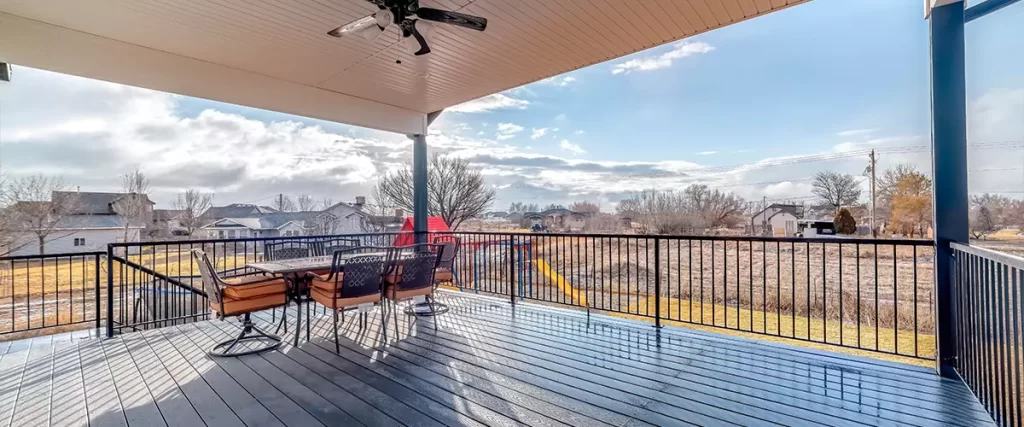
PVC And Composite Alternatives
Homeowners seeking low maintenance and durable decking options often turn to PVC as a wood-alternative solution. Unlike traditional wood decks, PVC decking stands up well to extreme weather conditions, resists stains and fading, and won’t succumb to rot or insect damage.
Its slip-resistant surface makes it a safe choice for outdoor spaces frequented by children and pets.
Composite decking is another popular alternative that combines wood fibers with recycled plastics for an eco-friendly option. It mimics the natural look of wood without demanding constant upkeep.
Composite decks are known for their heat-resistance which comes in handy during Denver’s hot summers, making them comfortable for bare feet even on sunny days. This affordable decking option also offers a variety of colors and finishes, ensuring that homeowners can customize their outdoor living spaces to match their personal style.
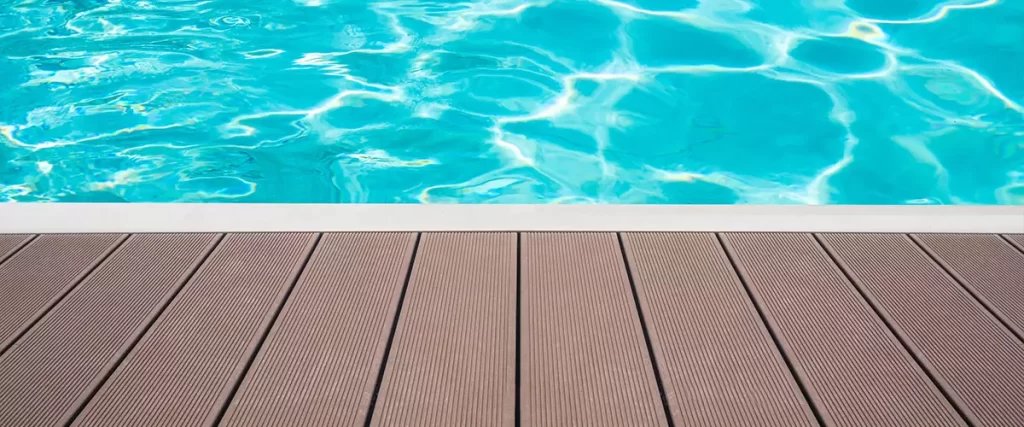
Conclusion
The choice between PVC and composite decking will shape the future of your outdoor space in Denver. Consider how each option aligns with your lifestyle, budget, and the climate challenges unique to Colorado.
Our experts at Decks For Denver can assist you in choosing the right material for your particular needs, lifestyle, and budget. If you want to be sure you’re 100% satisfied with your choice, contact us at (303) 475-5769 for a consultation or request a quote.
Let’s get you a deck tailored to your unique needs and home.
